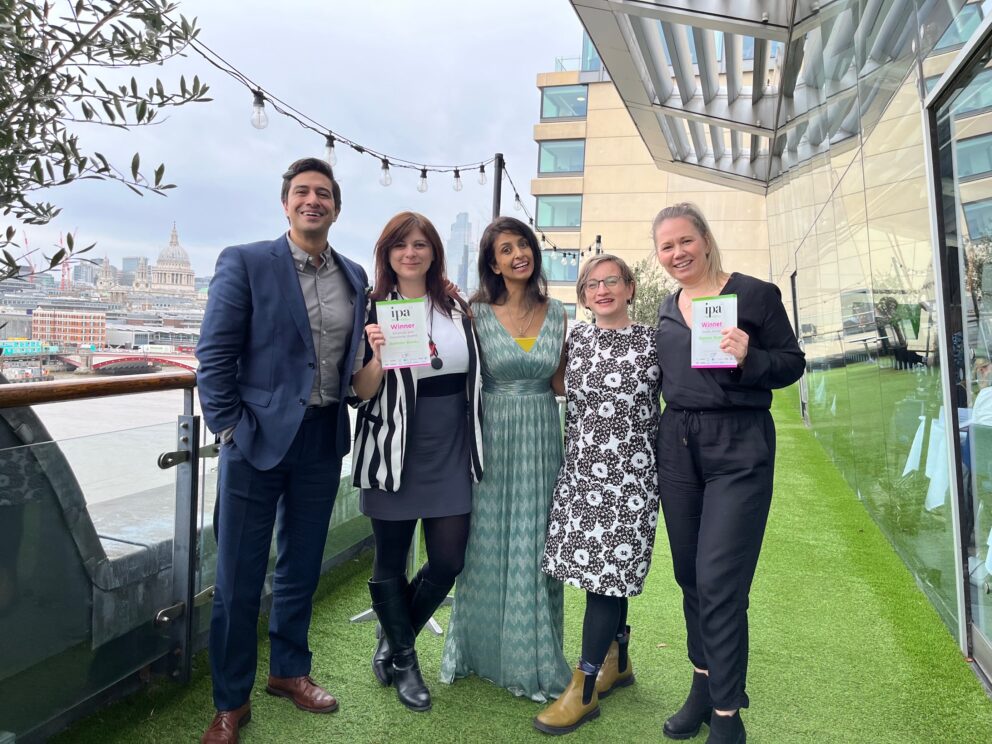‘Don’t get into the perfectionist thing’: Perminder Mann
Bonnier Books UK CEO Perminder Mann talks about her ongoing journey as a CEO for Work in Publishing Week.
Bonnier Books UK CEO Perminder Mann is a renowned publishing innovator. She co-founded Blink Publishing – the first publisher to collaborate with a vlogger, multi-bestselling Alfie Deyes. Perminder was recognised as one of the UK’s 100 most powerful leaders in a survey conducted by the Guardian and Operation Black Vote. She is listed on Green Park’s third annual Top 100 BAME Leaders in Business Index.
Monday 18th November to Sunday 24th November is Work in Publishing Week – an annual initiative run by the Publisher’s Association to inspire young people to pursue a career in publishing.
To celebrate this, Bonnier Books UK is launching a new series of conversations with people from across the business. The series aims to contribute to a more accessible space for aspiring publishing professionals to explore pathways and career opportunities.
For the first instalment, Perminder talks through her ongoing journey as a CEO – her first steps into publishing, her day-to-day work philosophy, and where her eyes are set for the future.
How did you get started in publishing?
It was actually my dream to work in film and theatre! I was offered my dream internship working on Channel 4’s Big Breakfast show – but it was unpaid and, like many others, I simply couldn’t afford to work for free. I took the decision to work for a year and save up for the internship.
I asked a recruitment consultant for advice and she suggested I put my theatrical skills to use in the field of sales. I thought “okay I’ll do that” and then went for a few interviews and very quickly became demoralised. The interviews were for cold calling selling advertising space and I thought, ‘you’re really not connecting with people here.’
‘My unconventional journey into publishing is part of the reason I’m so passionate about raising awareness about careers in the industry … we need people with all kinds of skills and it’s our responsibility as publishers to build knowledge of publishing in as many communities as we can.’
The recruiter then said they had a ‘non-traditional sales role’ at Macmillan Publishing and suggested I give it a go. I knew nothing about publishing – all that I knew was that I absolutely adored books. I remember walking into that office and realising that this was in fact a whole world that I could build a career in. I made it my business to land that job and never looked back – I had found my vocation!
My unconventional journey into publishing is part of the reason I’m so passionate about raising awareness about careers in the industry. There’s a large part of society that enjoys reading but doesn’t realise there’s a career here – and you can’t aim for a path you’re not even aware of. As an industry, we need people with all kinds of skills and it’s our responsibility as publishers to build knowledge of publishing in as many communities as we can.
How would you describe your role as CEO?
Ultimately, as CEO I’m responsible for making the final decision on what goes in within the business: the buck stops with me. I’m accountable to the shareholders for what happens in the UK, and I’m the caretaker of their interests. I’m responsible for protecting our brand integrity, and for making sure that we operate within corporate governance rules and structures.
During my day-to-day, I see my role as a facilitator. I’m responsible for putting great teams together and making sure they have a strong vision to work towards.
One thing I learned when I first became CEO was that, while there are clear responsibilities that come with this job, how you work that out in your day-to-day is down to the individual. How you operate depends on your own strengths, the size and nature of your business, and how much of your role is strategic and visionary and how much of it is involved in daily operations. It can be quite entrepreneurial, in that way.
What is important to you as a business leader?
I want people to feel connected with the business and feel like they belong here, and we have to build those connections from the top. I believe that as a leader you should be approachable. Your people have to feel like they can be curious and ask questions and not be judged based on that. I think it’s important to always be building a welcoming environment for learning and collaboration.
If someone were to decide they wanted to be in a similar position to you when they grow up, what sort of knowledge would that person need to develop?
I think it’s really important to keep an open mind: if an opportunity comes along outside your job description, within reason, you should do it.
‘I’ve always been excited by being asked to do things I have no experience in. Don’t get into the perfectionist thing … You really don’t need to be perfect.’
I’ve always been excited by being asked to do things I have no experience in. Don’t get into the perfectionist thing … You really don’t need to be perfect. What you need is some basic knowledge and a strong will! If you try things, you learn things, and that’s ultimately the only way to broaden your experience and knowledge. Talk to people in other departments: ask questions all of the time.
When you’re in a management position, the more you understand about how the business operates, the better placed you are to resolve issues and be solutions focused. A mechanic can’t fix a car unless they understand how the whole engine works.
If you have experience with different departments, your demands as a leader will be more practical. You will better understand the daily constraints and challenges that your teams face, and you’ll be more sensible when making decisions for the business as a whole.
Is there a philosophy you live and work by?
Yes – ‘It’s only a job.’
That’s how I stay grounded. I have a particular set of responsibilities: I have to be accountable and I’m in a position where I can give back to society, and inspire others, but ultimately, I’m doing a job. I’m no different from anyone else in the business or anyone else in the world trying to earn a living. Trying to balance their work, their life and their family. I’m just lucky I do a job that I love.
There’s a lot of publishing at the moment confronting major issues like climate change and political unrest. What role do you think publishing needs to play in increasing knowledge and driving solutions?
Our role as publishers is carefully curating quality content to help people navigate this crazy world we live in. You can go on Google to find an answer for something and be none the wiser seven hours later. You think, ‘I’ve read all this information, but I don’t really know what it means, in the broader sense.’ People can make their own mind up, but providing that quality of information; that curation and judgement is the primary role of publishers today. Reading allows us to grow and explore our knowledge – to create empathy for other cultures, societies, experiences, people.
The other side of that is entertainment and escapism: we will always crave a good story – whatever format that might be in.
You grew up in London – a place with a huge concentration of publishers and a prolific literary history. How do you think the London environment influences publishing, and vice versa?
Up until a few years ago, people always came to London to start a career in publishing. The environment only reinforces that ‘London DNA’ of UK publishing. Part of being a publisher was and still is having that shared experience of being in London – being a Londoner. It encourages people to conform.
‘If we want a diverse workforce, and diverse opinions, we must celebrate what that means day-to-day. We must integrate that aspiration into our everyday businesses – including how we publish, what we publish, and the way we sell.’
I think that is starting to change now – and a growing diversity of voices and experiences will help us to tell more authentic stories. It’s important, though, that when we recruit more inclusively from around the country, we remember that the motive is acquiring difference. As publishers, we have to make an effort to nurture and sustain that difference. There is a danger that, in starting to bring people in from more geographically-diverse backgrounds, they might look around them and feel pressure to conform to the idea of the traditional London publishing landscape. If we let that happen, then what’s the point? The whole exercise would be fruitless.
If we want a diverse workforce, and diverse opinions, we must celebrate what that means day-to-day. We must integrate that aspiration into our everyday businesses – including how we publish, what we publish, and the way we sell.
There is sometimes a sense of anxiety around early career publishers – this feeling of ‘I need to be in London, and I need to make myself into the right person to get this first job, and I’ll worry about my own experiences later.’
This is human nature. Let’s say you walk into a football match; you’re supporting a team, and everyone is wearing a certain colour shirt – and you’re wearing something different. You’re going to feel odd. If you want to be part of that group, you want to look like them – and learn the songs.
When I became CEO, I confess, I decided I needed to look more serious. Everyone kept saying I looked so young, so I chopped my hair short to make myself look older. I dressed differently. For five, six months I wasn’t happy – because I wasn’t being me. And then one day I sat down and thought – ‘I got here being me, what am I changing now for?!’
Being yourself is the only version of that is sustainable, and as a leader – if I want people to come into the company and be themselves – I need to live by that rule. People need confidence and trust to be themselves – and that takes time. Undoing a culture of conformity doesn’t happen overnight – but I do think it’s starting to happen.
What do you want to keep working towards?
If we publish for a wider audience, we create a larger book-buying market. Equality and diversity are crucial if we are to stay relevant as a business and as an industry. It’s about giving everyone the opportunity to love reading, and offering opportunities to engage with content and writers that speak to a whole range of different experiences.
‘We publish for everyone: most people will read a book if it’s the right book for them.’
I want us to continue to be proactive about reaching new audiences. I want to get rid of the term “core book buying market”. We publish for everyone: most people will read a book if it’s the right book for them.


